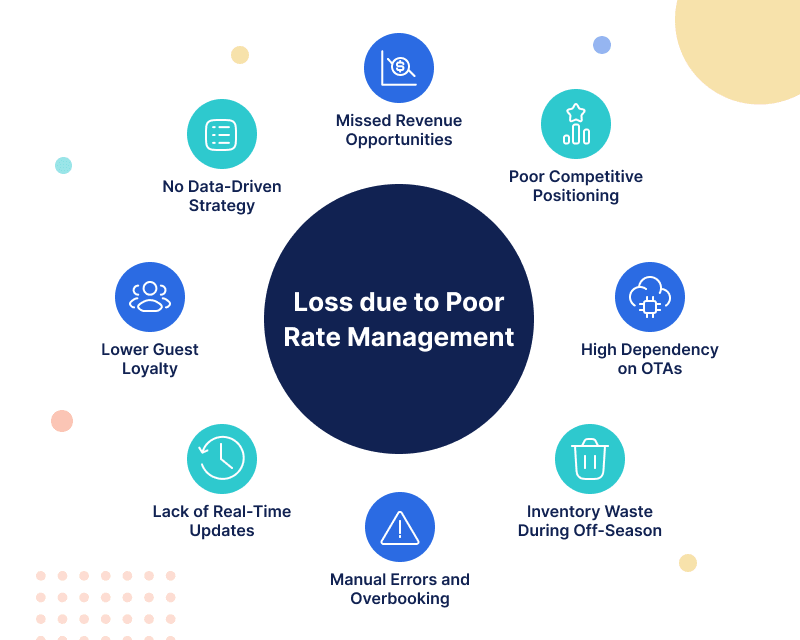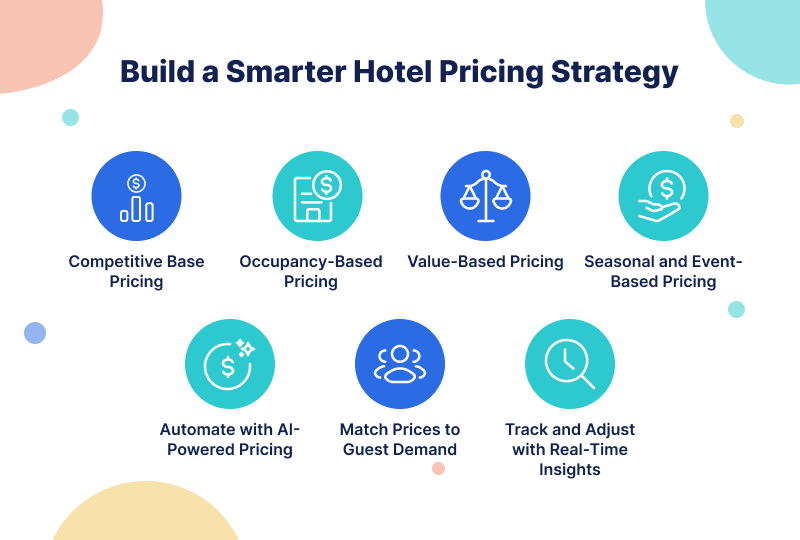INTRODUCTION
Hotel rate management is more than setting prices. It is the art of knowing when and how much to charge. Done right, it improves occupancy and can increase revenue, but done poorly, it drains profits.
In the modern hospitality landscape, hotel rate management is critical to both survival and success. Without it, even the most charming property can lose its edge.
This blog examines the often-overlooked impact of poor pricing and how effective strategies can safeguard your margins and reputation.
What Is Hotel Rate Management
Hotel rate management refers to the practice of adjusting room prices based on demand, season, occupancy, and competition. It helps maximize revenue without compromising occupancy.
Without proper hotel rate management, hotels either overprice and miss bookings or underprice and lose revenue.
What Poor Rate Management Costs You

- Missed Revenue Opportunities
- First of all, poor pricing means you often sell rooms for less than guests are willing to pay.
- When you do not adjust rates in real time, you leave revenue on the table. That is money lost every single night.
- Over time, these missed gains compound into major financial gaps.
- Poor Competitive Positioning
- Without smart hotel rate management, your pricing might fall out of sync with the market.
- Competitors who offer better prices will secure bookings faster and attract more loyal guests.
- This weakens your brand presence and reduces your chances in a crowded marketplace.
- High Dependency on OTAs
- Furthermore, hotels without solid pricing often lean heavily on Online Travel Agencies.
- OTAs offer reach but at a cost. High commissions cut deep into your margins.
- If you depend too much on these channels, you lose control over your direct pricing.
- Inventory Waste During Off-Season
- When rates are not aligned with seasonality, rooms sit empty during slow periods.
- This idle inventory still incurs fixed costs like housekeeping and utilities.
- Without smart hotel rate management, you waste valuable capacity.
- Manual Errors and Overbooking
- Another risk is human error. Manual updates across multiple platforms can lead to double bookings or incorrect pricing.
- These mistakes upset guests and damage your online reputation.
- They also increase refund rates and reduce repeat stays.
- Lack of Real-Time Updates
- Today’s visitors make last-minute reservations and continuously analyse their options.
- If you don’t adjust your prices to reflect changes in the market, you lose out.
- Real-time updates are necessary to remain visible and competitive.
- Lower Guest Loyalty
- Inconsistent pricing also confuses repeat guests.
- If someone books at a high price and later sees a steep drop, trust is broken.
- This lack of fairness leads to lower loyalty and fewer direct bookings.
- No Data-Driven Strategy
- Finally, without proper tools, decisions are based on guesswork.
- There is no clear link between pricing actions and booking outcomes.
- This leads to reactive planning and missed growth opportunities.
Build a Smarter Hotel Pricing Strategy

- Competitive Base Pricing
- Start with a strong understanding of local competitors and market standards.
- Set base prices that align with value while allowing flexibility.
- This ensures you are neither overpriced nor undervalued.
- Occupancy-Based Pricing
- Adapt rates according to real-time occupancy levels.
- When rooms fill up, rates should rise to reflect demand.
- When bookings drop, slight reductions can keep occupancy stable.
- Value-Based Pricing
- Pricing should be based on perceived value rather than just cost or competition.
- Extras like better views or early check-in will cost more.
- Both your revenue and guest satisfaction are increased with this model.
- Seasonal and Event-Based Pricing
- Align prices with local seasons, holidays, and events.
- Higher demand periods should reflect premium pricing.
- Lower seasons can be balanced with promotions to avoid losses.
- Automate with AI-Powered Pricing
- Automated tools analyze data and adjust rates faster than humans ever could.
- They factor in trends, events, and competitor activity in real time.
- This reduces manual work and increases pricing accuracy.
- Match Prices to Guest Demand
- Not all guests value the same things. Some prioritize price. Others value amenities.
- Use Guest segmentation to offer tailored rates. This brings better conversions.
- Segmented pricing is the future of hotel rate management.
- Track and Adjust with Real-Time Insights
- Track the hotel’s performance every day. To keep an eye on KPIs like ADR and RevPAR, use dashboards.
- Instead of making big changes later, make small changes often.
- This approach helps you stay agile and informed.
COMPARISON TABLE WITH IMPACT
| Strategy Element | Poor Rate Management | Smart Rate Management | Impact on Revenue and Operations |
| Base Pricing | Based on assumptions or outdated standards | Tailored to market trends and guest expectations | Leads to more consistent and optimized earnings |
| OTA Dependency | Heavy reliance on external channels | Balanced mix of direct and third-party bookings | Increases profitability and brand control |
| Seasonality Use | Ignored or inflexible | Adjusted to demand patterns and local events | Boosts occupancy and revenue throughout the year |
| Automation | Manual updates with delays | AI-assisted pricing and dynamic rate control | Reduces errors and improves speed and accuracy |
| Guest Loyalty | Affected by inconsistent pricing | Strengthened through fairness and clarity | Encourages repeat stays and higher satisfaction |
| Real-Time Updates | Reactive and slow | Instant adjustments based on live data | Maintains visibility and competitive edge |
| Data Use | Lacks insight or direction | Informed by dashboards and performance tracking | Enables proactive and strategic planning |
Smart Pricing with QloApps
QloApps helps hotels maintain steady and flexible pricing without added complexity.
It supports rate adjustments based on timing, demand, and availability.
By keeping pricing consistent and timely, QloApps allows hotels to focus on operations while staying competitive.
A practical option for hotels looking to improve rate management with clarity and control.
CONCLUSION
In the hotel business, poor rate management is an invisible leak. It appears small at first, but it grows quickly.
With smart pricing, you protect your profits and gain loyal guests.
Tools like QloApps can help you shift from reactive to proactive planning. Start managing rates better and watch your revenue grow.
Get in touch
If you’re ready to increase your hotel’s revenue or have any questions, QloApps is here to assist!
Let’s collaborate to streamline your processes and enhance guest satisfaction.
Discover how QloApps’ Property Management System and Channel Manager solutions can simplify your operations and boost your revenue.
Get in touch now, and future-proof your business for the future of hospitality.
Be the first to comment.